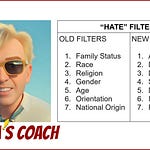In this no-holds-barred Juneteenth livestream, Mark Whitney—America’s Coach—breaks down the uncomfortable truth behind America’s “abolition” of slavery. Armed with a mug of designer water, a copy of the 13th Amendment, and 35 years of experience paying the “Felony Tax,” Whitney argues that slavery was never abolished—just rebranded for the criminal justice system. From prison labor at 12 cents an hour to being locked out of professional licenses and basic rights, he exposes how the 13th Amendment legally sustains a caste system for the “duly convicted.” Equal parts funny, furious, and factual—this is your Juneteenth reality check.
Show Notes — America's Coach (June 19, 2025)
Recorded Live In San Diego, CA · 9:00A Pacific
Theme: Juneteenth
“If you're in a room with me, and we’re just having coffee—50% of us are felons.”
“Before the Emancipation Proclamation, the Constitution was silent on slavery. After it, slavery was institutionalized.”
“Twelve cents an hour is not a wage. It's a stipend—and that legal wordplay keeps the system running.”
UNOFFICIAL TRANSCRIPT (video is authoritative)
OPENING BILLBOARD · HOUSE ANNOUNCER, SHADOE STEVENS
Ladies and gentlemen, from San Diego, California, Mark Whitney.
COACH
Here we go. Let's do this. Let me get a little drink of water here. You're the first people I talk to. Welcome, everyone, to America's Coach. It is nine o'clock Thursday morning—Juneteenth. Juneteenth. It is 67 degrees and cloudy in beautiful San Diego, California, where I am this morning.
If you're looking at the livestream title—the title on this livestream—here we go. Let's have some fun today.
White guy says Juneteenth is a lie. Juneteenth is a lie.
A lot of my white friends don't even know what Juneteenth is all about. A lot of my Asian friends. Juneteenth celebrates the abolition of slavery—June 19th, 1865. The Emancipation Proclamation.
Today is Juneteenth—June 19th, 2025. So 135 plus 25—160 years ago—Lincoln issues the Emancipation Proclamation and abolishes slavery in the United States. Gets rid of it. No slavery.
Let me see. Let me just take a drink from my mug... ooh, ooh, ooh. I didn’t have time to put anything in it. Here, here—wait, wait, wait. We can do this. We'll do an act-out with props. Look, we'll put some of my designer water in there. From Arkansas, one of the states that still had slavery. There. Cheers. Here’s to Juneteenth, from my bullshit mug. Mmm.
Abolish slavery in the United States. Now, we know that’s true. Because if you go to Wikipedia—I'm gonna bring... yeah, you can't— I messed up. Here, we'll just go to the New York Times. You go to the New York Times. Right here. This is today’s New York Times. I got it from the website. But they've got some recipes here. Right? Some strawberry pie and some collard greens. And yeah, you’ve gotta have a chicken sandwich, right? Because only Black people like chicken sandwiches. You can celebrate Juneteenth right there. New York Times says so.
Well, I beg to differ. I beg to differ.
Why is that? Let me show you. Here, I'm going to show you on the SkyCam.
You still with me? I got it right here. I'm running a little late with some of my displays this morning because I decided at the last minute to do this show. I couldn't decide whether I wanted to take this on as a white man. But I'm doing it because I've got the credentials to do it.
This is the 13th Amendment. This was part of Reconstruction. This was the result—one of the results—of the Emancipation Proclamation. We the people, through our representatives, got together and ratified the 13th Amendment.
"Neither slavery nor involuntary servitude..."
Except—what's this? Except. Except what?
Except what, I wonder?
"Neither slavery nor involuntary servitude..." except as a punishment for crime whereof the party shall have been duly convicted.
So ignore the red part. Ignore the red part and just read along with me, okay?
"Neither slavery nor involuntary servitude shall exist within the United States or any place subject to their jurisdiction..."
Right?
"...shall exist within the United States."
So they abolished slavery. But it says: except as a punishment for crime whereof the party shall have been duly convicted.
Well, I am one of those people.
Seventy-seven million of your fellow Americans in the United States have a criminal record.
Seventeen million of those—nearly twenty million—have been convicted of a felony. And a felony is defined as any crime in which you can spend more than—where the maximum punishment is more than one year in jail. That’s a felony.
In 1991, the summer of 1991, a jury of my peers transformed me into a felon.
So why am I talking about slavery?
I'll tell you. Right there. You can go to this on your little device or on your big device—Unicor. Unicor.gov.
There’s a happy slave right there. Right? There he is. And if you look carefully into your device, you can see over his shoulder, there are some other happy slaves—and goddamn if they aren't the same exact color skin that he has.
Unicor is a corporation owned by the government—similar to the post office. So United States Postal Service is an independent corporation owned by the government. It's meant to self-sustain, and when it doesn't do that, the government gives it tax money to keep it going. Unicor is the same thing. Unicor owns Federal Prison Industries, and it is administered by the Department of Justice.
And when I was convicted of lying to the bank in 1991—the reason...
Do you like irony?
The reason I was convicted was—the judge instructed the jury. And this, I remember sitting there when I heard him say this, because I thought I was going to win. I did win on some things, and the jury was hung on some things. But they did convict me. And they did turn me into a felon. And I did win several appeals and get my sentence declared unconstitutional. But I'm a felon to this day.
There are 260 million people in the United States who are 18 or over. Nearly 10% of them are felons. Is that right? Seventeen million out of 260. No, I’m overstating the case. Let’s say 7 or 8%. So if you are in a room with 100 people, you’re in a room with 7 or 8 convicted felons.
That’s just math.
And if you’re in a room with me, and we’re just having coffee, 50% of us are felons.
The judge instructed the jury that they could convict me for a material omission—like if I left something out that was important to the bank’s decision to loan me money.
So when I gave the bank a tax return—I showed the bank what I earned that year on the tax return—the material omission is that I never filed the fucking tax return.
That is something the bank would have wanted to know. If the bank had known that I hadn’t filed that tax return I was handing them, even that bank wouldn’t have loaned me the money. And they were dying to loan me money, because I had Ben & Jerry’s franchises and this was Vermont. And this was back in the ‘80s when everybody was into Ben & Jerry’s. Now it’s owned by Unilever.
Material omission.
So—let’s go back to the SkyCam.
If you listen to NPR today, if you read the New York Times—pretty much if you consume any kind of media—people are going to be talking about what a great day this is. Because goddamn, I mean, come on. The previous president, Congress passed a law, and the president signed it, making Juneteenth a federal holiday because we don’t have slavery in the United States.
But it says right there: except as punishment for crime for the duly convicted.
Now, let me ask you: You can read the third grade, right? You got a third-grade reading level?
Anywhere there—do they put a time limit on that? Do they put a time limit on that anywhere in there?
They do not.
And that is why, if you become a convicted felon, you have to be very resourceful.
So the fact of the matter is: slavery was not abolished in the United States.
Before the Emancipation Proclamation, our Constitution was silent on slavery. It said nothing about slavery.
Because of the Emancipation Proclamation, slavery was institutionalized.
And just like the Black Codes, they called it Black Codes back in the day in the deep South. I'm in San Diego, so I'm south of Oregon, but I am not in the South. Okay, the South, back in the 1800s, they had what are called black codes where they criminalized everyday activity. They would criminalize everyday activity, like, for instance, vagrancy. It's everyday activity. They would make it a crime. And then they would get you in the system and they'd turn you into a slave. That's how it worked with the black codes. So what are some other everyday activities that we criminalize? Oh, I don't know. War on drugs.
That's now more than 50 years old. Elvis had a meeting with Nixon. Boom. And the war on drugs was born. That's everyday activity that we have decided to criminalize. And now marijuana has been decriminalized in many states. It's still illegal. Under federal law. They don't prosecute it, but it's still illegal. Try running for president. Try running for president on a platform of ending the drug war. Let me know how that goes for you. Let me know how that goes for you. I actually did that in 2020. And here I am doing a podcast. So it's not going to go well. People love the drug war. They love it. They quietly love it. They don't have a problem with it.
So let me tell you what it's like to work in one of these factories owned by Unicor, because I worked there and I got 12 cents an hour. I was actually fired. So Unicor exists based on the theory that they are rehabilitating people. But that presumes you were habilitated in the first place, which I was not. But it prepares you for nothing. It prepares you for nothing. You don't get out of prison, right, and hand out a resume that shows you worked in a prison factory. And what about that money, that 12 cents an hour?
12 cents an hour is a slave wage, isn't it? That's a slave wage. Nope. It's not a wage. I know because I was running the law library when I wasn't working in the prison factory and me and a bunch of my smart friends got together and we did the research and we go, you know, because when we're working in the factory, OSHA, occupational safety and health administration, the OSHA rules applied to the factory we worked in just like they would in any factory. It had to meet the standards of devotion in order to operate.
But $0.12 an hour is not the minimum wage, is it? No. So a bunch of us, two or three of us inmates who were getting really good at the law, we researched it. Because we thought it'd be fun. We had time. We thought it'd be fun to, we not only had time, we're doing time. We thought it'd be fun to sue the Bureau of Prisons and say we're entitled to the minimum wage. Turns out they already thought that through. They already thought that through. Those racists down in Congress. It's not a wage. It's a stipend. And a stipend is not taxable. Wages are taxable. But if you just call it a stipend, you don't have to pay minimum wage. You don't have to do withholdings. You don't get Social Security. It's a stipend. Now, why can they do that? Okay, I can't emphasize this enough.
Because they can do that because you are duly convicted. You are literally a second-class citizen, which means you're no longer a normal citizen. You're a convicted felon. So I'm now 66. I was convicted in 1991 for lying to the bank in 1987. So it's nearly 40 years ago, right? If I lied in 1985, that would be 40 years ago. Now tomorrow, I'm going to do a show about why nobody can buy a house.
Why nobody can buy a home. That's tomorrow's show. How do I know that? Because I owned a real estate brokerage in San Diego. I should say I own half a real estate brokerage. We don't sell real estate. I mean, we do, but that's not the focus. The focus is on managing these big, expensive luxury homes here. I've been involved in software and online businesses since 1995. Done really well with that. I wanted to create something offline that was sustainable because the robots are coming. So what better thing than to target only single family homes in one of the richest areas on the planet, which is coastal San Diego County. And this has worked out really well. But here's the catch. Here's the catch. I took the real estate exam with like 300 people. I didn't study for it.
I finished first and I waited outside in the lobby to see how long it would be before the person who finished second came out. It was nearly a half an hour. We had three hours. I finished in 75 minutes. I passed the exam. Oh, here's the other thing. I didn't study. And the reason I didn't study is when we started our brokerage, we were building a software platform and I read, all of the Department of Real Estate Regulations in California and all of the statute three times. So I didn't need to study. I'd already read this stuff, mastered it, knew everything about it because we're creating a best practices platform that other real estate agents could use in their business. Now, do you think I could get a license? No, I can't get a license. Why? Well, again, I can't emphasize this enough because I was duly convicted.
That's just one of the thousands of things that I can't do as a convicted felon because I'm a second class citizen because of the 13th Amendment. If it wasn't for the 13th Amendment, it would be unconstitutional for them to keep me from getting a license. It would be unconstitutional for them to deny. I wouldn't rent to me. We rent homes for like $15,000 a month that people own in these really rich areas. I wouldn't rent to me. I'm a convicted felon.
But my point is we can ask. Have you ever been convicted of a crime? We can ask that on the application. We can deny housing based on that status.
You can be denied employment based on that status. You can't deny employment based on race. You can't deny based on gender, based on sexual preference, based on religion, based on all these things. But you can deny these things if someone is convicted. Why? Because of the 13th Amendment. Because it's in the Constitution. Right? Duly convicted. When my kids were in high school, I couldn't chaperone them because everyone's so security freaked out on the chaperone thing that they get at the high school. They say, have you ever been convicted of a crime?
So there are all these things I can't do. I can own a brokerage, but I cannot talk to consumers. We need to have licensed people. I need a partner for that. So I have a partner. Right? Go to dreammanager.com, 1M, dreammanager.com. You'll see my partner, Rose Fletcher, there. You'll see my wife who has a law degree and a real estate license. You'll see my son who has a real estate license. So we're not just regular real estate people, right? So we manage about a half a billion dollars worth of real estate. And each one of these homes we manage is its own small business. Each one is a business. And a lease to rent a home that we manage runs about 90 pages. So we're part law firm, right? Part law firm.
Part general contractor, part accountant, part finance. So my partner has an MBA in finance. My wife has a law degree. These are the kinds of people that we need to have to do this very, very complicated business. My son started a business, an Amazon business. He was like 21 and grew it up to be a $15 million company. We are really sophisticated small business people. And I am the most sophisticated of all, and I am not allowed to talk to consumers. So in order for me to exist in commerce, I have to have proxies who trust me, a business partner, a wife. I can provide money. I can provide ownership. I can train the real estate agents. That's fine. There's no law to protect the real estate agents from me, but they have a law to protect you from me. Why? Can they do that? Because of the 13th Amendment. There is nothing I can do. So don't give me this bullshit that slavery has been abolished when there's a $400 million company owned by the government employing slaves.
And garnishing their stipend to pay these nickel-dime fines and $50 assessments they have for each conviction.
I mean, I'll never forget what the judge said. Mr. Whitney, three years in prison, three years supervisor lease, and $50. What? $50. What's that? Well, that's for the count. You get $50 special assessment for the count, for this count you're convicted on. And so when you get to prison, there's three people who make up your team who work at the prison, and they meet with you every three months, and they see how you're doing paying down your $50 at 12 cents an hour. I'm telling you, it's government work. And why is the prison full? When I was there, there were 900 people in a prison designed for half that amount. It's filled because of the war on drugs, because they make everyday activity illegal. People love cocaine. They know that.
And they know that black people like to put cocaine in the microwave and turn it into crack. I don't know if they're still doing it, but back in the day, they knew it and they had studies to prove it. So the crack penalty was 10 times greater than the cocaine penalty. So if you were white and you were in prison for selling cocaine because you had a habit, and that's most of the people there were selling the coke because they were addicted to coke. And if you were white and you were there for selling coke you were doing less time because you were snorting it i i lived in a cell with a guy named mike from jersey city, who the the thing that separates his nostrils there's a big hole in it and he could he could pull a string through it he could shove a pencil all the way into the back of his head because the cartilage was all gone from all the coke that he snorted it was like a circus trick he'd take a pen You know, let me see if I can do it. Let me see if I can replicate it for you. He'd do it like this, and it would disappear, but it'd be inside his head. And he'd pull it out. It was like entertainment for us. And the black guys were doing crack. And they had to do like 10 times as much time. They get a 10-year mandatory minimum. Ruined their whole lives. And when they get out, they can't do anything. Why? Because we still have slavery in the United States. God damn it.
But now we have a federal holiday that says we don't have slavery. What the hell? You trying to drive me crazy? Am I meant to just stand by and be quiet? I am sick of this shit. Stop lying to me. Stop lying to people. Stop lying to children.
We have more prisoners in the United States per capita than any other country, over 2 million. And that war on drugs, that's why there's an immigration problem. Everyone's talking about immigration and nobody wants to address the cause. Central America can't help it that they exist next to the richest country in the world. and we love cocaine and we will pay anything for it. There's enough cocaine warehoused in the United States to get us through the next hundred years. That's true. And that's why people are coming across the border to escape the cartels that our war on drugs funds. That's real. And if you can't handle that reality, right? So just know, just know, if you are wringing your hands about all the violence against immigrants, and I've been talking about it a lot, but I'm not wringing my hands. I'm following through here. I am against the war on drugs because I am against violence on immigrants and violence on Alex Padilla, who's trying to represent you. I oppose those things.
I oppose those things, and that's why I oppose the war on drugs. You legalize drugs? Those cartels legalize drugs, and those cartels go away. They don't exist, and people don't have to walk seven years in their bare feet with their kids in their hands and take boats that they pay all their life savings to pirates. We just had a couple of kids die, like literally, like the ocean is right. See where I'm pointing over here? The ocean is right over there. That's where they keep the Pacific Ocean. Like a month or so ago, I was driving in here to do this show, and the Coast Guard helicopters were flying really slowly. And they're looking for these two dead kids that died trying to get to the shore in one of these pirate ships that is indirectly funded by America's War on Drugs. So don't tell me that you're all upset about the violence against these immigrants that were watching these mass thugs who couldn't make the football team run around and pick up these people in courthouses and churches and elementary schools. Don't tell me you oppose that unless you also oppose the War on Drugs. And you want to re-legalize these drugs.
Not legalize them, re-legalize them. Because there was a time when they were not illegal. Just re-legalize them. And all the crime associated with it goes away. And those cartels go away. And people can just live in Venezuela. They can just live in Guatemala. They can just live there.
It's so simple.
Tomorrow, I'm going to tell you why nobody can buy a house. I feel better now. I hope you do, too. My name is Mark Whitney. I have been America's coach. That's my half hour for today. And I appreciate you stopping by. We're here every day, Monday through Friday, live, right here on this here internet. We'll see you tomorrow morning.
CLOSING BILLBOARD · SHADOE STEVENS
Keep Banging!
Music











